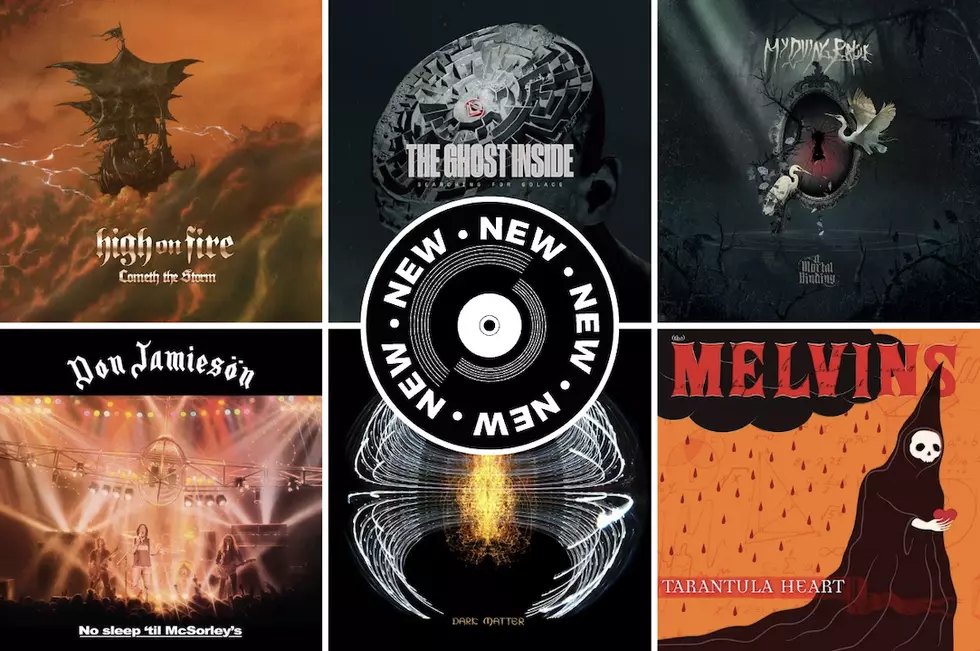
10 Metal Songs That Make a Great History Lesson
Alright class, welcome to Heavy Metal History 101. Throughout this course, we’re going to cover historical topics ranging from ancient Egypt to recent world events. However, this class is going to be taught through a different medium than what's typical of a standard history course.
You won’t have to worry about purchasing expensive textbooks, as these lessons will be taught through heavy metal music. Numerous artists draw inspiration from the events of the past and offer reflection on what has happened. We will be discussing both aspects in this class, so be ready to participate. Each lesson will be taught through one song, so get your notebooks out and start taking notes as we discuss 10 Metal Songs That Make a Great History Lesson:
'The Essential Salts'
NileEgyptian history fanatics Nile have penned countless songs about of one of the most fascinating cultures in all of history. ‘The Essential Salts’ describes the ritual of reanimation by boiling cut up parts of the body and bones until the water is gone and all that is left is a white substance. This contains the salts of the subject of reanimation, which will then turn to the flesh as words are spoken. The song goes on to describe what takes place next and what will happen if the salts are contaminated. The reanimated subject will experience lunacy and must be immediately killed. The necromancers who have gone through the process of improperly reanimating the subject must also be killed by strangulation with a cord. Their bodies are then burned and tossed into the Nile River. Bet you didn’t learn that in your Egyptian history class, did you?
'Alexander the Great'
Iron MaidenIron Maiden have written about history quite a lot, but never in the manner of ‘Alexander the Great.’ While most Maiden songs involving history offer some reflection, this one is treated more like a brief history lesson of one of the world’s greatest conquerors. The song offers insight into Alexander’s life, born of Philip of Macedon, and details a chronological series of events. The locations of major battles and opponents are enough for anyone to earn an A on a quiz. The band even mentions the influence the conqueror had on the times, which was the spread of Hellenism that ultimately paved the way for Christianity. Consider ‘Alexander the Great’ as a study guide for your Greek history class.
'Indians'
AnthraxNew York thrash masters Anthrax released the landmark ‘Among the Living’ in 1987, which contained a song about a shameful mark on the European settlers of North America. ‘Indians’ highlights the regretful actions that were taken against the Native American tribes and what we have learned from our past. Anthrax write about some of the horrors faced by the Native Americans juxtaposed by notions of peace and a desire for a world without prejudice. Aware we can never take back what has happened in the past, Anthrax display that the best way to honor those who died is to learn from our mistakes so we won't make them again.
'Hold at All Costs'
Iced EarthIced Earth mainman Jon Schaffer is an American history buff and even owned his own historical collectibles store called Spirit of ’76. ‘The Glorious Burden’ is the debut of Tim ‘Ripper’ Owens fronting Iced Earth and an album dealing predominantly with American history and patriotic themes. ‘Hold at All Costs’ is about the second day of the Battle of Gettysburg during the American Civil War. The Union’s left and right flanks were assaulted by waves of attacks. Out of ammo, there was no option for retaliation but to charge the next wave with the bayonets on the rifles. A major turning point, the Union held off the Confederacy in the deadliest battle of the war.
'Stalingrad'
Hail of BulletsThe Dutch death metal supergroup Hail of Bullets have dubbed themselves “World War II Metal.” The moniker suits the theme very well, as the band tackles an array of incredibly specific topics from World War II. The Battle of Stalingrad is one of the most notorious battles from the war. Hail of Bullets don’t tread lightly here, detailing the chain of events that unfolded during the battle with brutally vivid imagery of the dead peppered in for the death metal palette. Martin van Drunen’s intelligible vocals help ‘Stalingrad’ serve as a mini-lesson on the battle. Next time you’re in a history class and are discussing WWII, offer to play the class some death metal to help them pass the next test.
'Primo Victoria'
SabatonSwedish power metallers Sabaton pride themselves on writing about military history. ‘Primo Victoria’ is the opener of the band’s debut album of the same name. The song is about D-Day and sports a marching tempo to invoke the feeling of war. The lyrics deal with the mindset of the soldiers about to land on the beaches of Normandy, knowing the risk of not making it back alive. The brotherhood mentality of the army is in play here describing that dying is selfish because other have died before and the overall aim is to destroy the Nazis. The operation is a team effort, which is all that matters. Sabaton do a tremendous job of opening the album and putting the listener in the shoes of someone at war.
'Manhattan Project'
RushRush are referred to as a progressive rock band, but they’ve dabbled in sounds akin to the term heavy metal, thus fitting for this list. Anyway, Rush consistently wrote thought-provoking lyrics, with no exception here. They meld their reflection into a bit of history about the song’s namesake, which was the name of the project to develop the atomic bomb. The lyrics are predominantly vague, but enough to inform listeners about the project and subsequent event. Rush express the regret felt by those who commanded the dropping of the atomic bomb on Japan, and, in the last verse, give the name of the pilot and the month of the event. You can thank Rush when you nail that Jeopardy question.
'Angel of Death'
SlayerSlayer’s masterpiece ‘Reign in Blood’ kicks off with the impeccable ‘Angel of Death.’ The Jeff Hanneman penned song depicts numerous terrors that took place in the Nazi concentration camp Auschwitz. The title is taken from the nickname of Dr. Josef Mengele, who was a physician at Auschwitz. He is infamous for the medical acts of horror described in the song. His gruesome experiments on the Jewish prisoners are given only small details here, but they are more than enough to turn your stomach inside out. History classes often go into little vivid detail about the heinous acts of the Holocaust, but ‘Angel of Death’ doesn't hold anything back in its description of this horrific event.
'War Pigs'
Black SabbathThis iconic Black Sabbath song was originally titled ‘Walpurgis’ and was overtly Satanic, dealing with the witches’ sabbath. The label wasn’t entirely down with this, so they asked the band to change the lyrics. The result was a song that has stood the test of time and a glimpse into the global mindset of the Vietnam War. ‘War Pigs’ serves as a time capsule, and is one of many protest songs against the war in Vietnam. The song discusses the mentality of politicians and war versus the people they send to their deaths in the field. The song ends, depicting the end of war and those who ordered it desperately repenting their sins, but it is too late and Satan mocks them.
'Wind of Change'
ScorpionsAlright, this is a ballad, yes, but it’s by a metal band so it still counts. For the German group Scorpions, the tearing down of the Berlin Wall was an emotional moment that could only be captured in song through a ballad. ‘Wind of Change’ describes the feeling of the wall that divided East Berlin and West Berlin for so long and what it means for the future. The tearing down of the wall saw the reunification of Germany for the first time since the end of World War II. It meant the most for those living in East Berlin because of the wildly different living conditions they faced than fellow Berliners in the west. The Berlin Wall was a gloomy reminder of the war that the citizens could now finally move on from.
More From Loudwire









